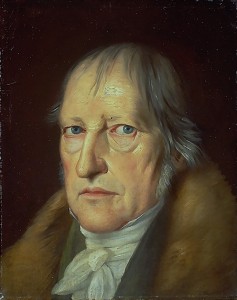 German philosopher Georg Wilhelm Friedrich Hegel (1770 – 1831) doesn’t take a significant place in ethics compared with philosophy in general. But he made a very decisive step forward – the transition from ethics of goodwill to the ethics of socially meaningful activity. This step was necessary for the appearence of a historical-materialistic theory of morality.
German philosopher Georg Wilhelm Friedrich Hegel (1770 – 1831) doesn’t take a significant place in ethics compared with philosophy in general. But he made a very decisive step forward – the transition from ethics of goodwill to the ethics of socially meaningful activity. This step was necessary for the appearence of a historical-materialistic theory of morality.
In general, according to Hegel a law can be understood in its three core values. I. A right in the sense of freedom. Freedom and law have the united understanding. So the freedom is the existence of will, as Georg Hegel believed that thinking and will – are only two ways of the ability to think: theoretical and practical. The ratio of freedoms and rights has realization through the dialectic of free will. II. Right as a definite step and form of freedom.
A special law, also so-called second definition of law mentioned by Hegel, represents a definite hierarchy of special rights – from abstract forms to certain specific. One special right “taking away” the previous one,another more abstract special right, shows his truth. Any more concrete special right will be primary and stronger than the more abstract one. III. Right as law or positive right is one of the special rights. Georg Wilhelm Friedrich Hegel himself wrote in this regard:
“The meaning of a right in himself, is put in its objective being .”
Distinguishing right and law Georg Hegel is trying to eliminate their opposition. He understood that the understanding of the law may change in the legislation process, that’s why not every law is a right.
According to Hegel, free will has three main formation, and on this basis we can separate three main development levels of such thing as an objective spirit. The three main formation and basic levels of development are:
abstract law, moral (ethics) and morality.
Abstract right is the first link in the development of the concept of law from the abstract to the concrete one. At this stage, the main thing is certain individual freedom. Thus, a person can begin only here because it is not certain concrete “I” in his self-knowledge, but simply an abstract “I”. This freedom in the sense of Georg Hegel is awareness of human rationality, and not the possibility of permissiveness. In other words, a person who acts rational – acts free. Also at this stage a positive law is not proved yet, there is still only formal legal commandment:
“..be a person and respect others as persons.”
The right expresses the will of the individual, which seeks to satisfy its own specific problems. In general abstract right includes property relations and has a formal nature. Provisions of an abstract right are formulated with prohibitions.
A significant and outstanding moment in the history of philosophy remains a philosophical doctrineof Georg Hegel about law and morality. Right by Hegel is not something impossible. Right in his philosophy is the way of realization of the freedom, which is the same reality as the right.
Morality is the second level of development in the concept of objective spirit. Morality is a step higher, because the formal right gets positive sense. In the moral free will is determined through internal awakening of the individual, his thoughts and intentions, when the free will in the right was defined by outside image. Georg Hegel’s doctrine of moral problem shows the solving the problems of subjective side of offenses.
Morality is active, manifests itself in concrete actions, is not only the activity of consciousness. At this stage, the freedom of the individual is determined by the ability to set specific goals, to strive for happiness, make a conscious action and determine their behavior with their responsibilities to other individuals. Moral of Georg Hegel very closely linked with the category of responsibility. Analyzing dialectically the categories such as intentions and good, and good conscience and others, Hegel makes a lot of productive ideas. The interesting thing is Hegel’s understanding of moral of duty subject:
“… Have an understanding of good, make it your intention and do in the activity.”
The third stage in the development of the objective spirit is morality. At this stage the person realizes that morality is overcomes unilateralism of formal right and subjective moral , also all contradictions between them are removed. Georg Hegel believed that communicating with others we gain moral freedom. Moral consciousness is formed by the family, state and civil society. Personality itself subordinates the actions to the general aims when comes into variety of communities. According to Georg Hegel, morality – it is like a different , social, human nature, which is higher than the first, individual.
Separating moral and morality, Georg Wilhelm Friedrich Hegel made an important step towards the historical understanding of morality. When looking at the three stages of development of the objective spirit by the known pattern, then right – is a thesis, moral – is antithesis, and morality – is a synthesis.
Thus, Hegel’s philosophy of a right – is one of the variants of a natural law thinking, which is based on an idealistic outlook. The main purpose of the philosophy of right is to clean it from the ideas of a natural law. Georg Hegel believed that natural law is the most reasonable basis for positive law, but when it is not eternal and static, it is considered the “idea” to be at the rest condition.

This is truly useful, thanks.
I enjoy the report
Saved as a favorite, I actually enjoy your blog!